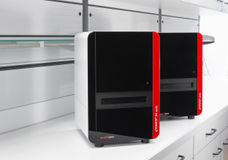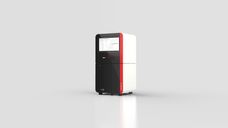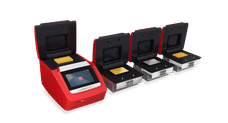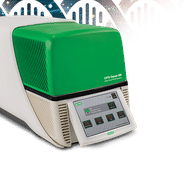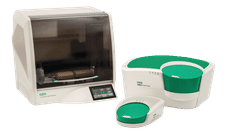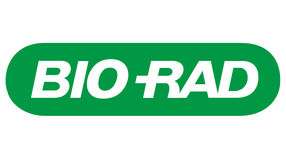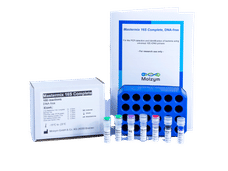PCR thermocyclers at a glance: products, function and application
A PCR thermocycler performs repeated temperature cycles to enable DNA amplification in the polymerase chain reaction (PCR). This page provides an overview of products from different manufacturers.
Are you looking for general information on this topic? Our thermocycler guide provides you with all the important information on how they work and how to use them.
PCR thermocyclers at a glance: products, function and application
A PCR thermocycler performs repeated temperature cycles to enable DNA amplification in the polymerase chain reaction (PCR). This page provides an overview of products from different manufacturers.
Are you looking for general information on this topic? Our thermocycler guide provides you with all the important information on how they work and how to use them.
Advertisement
PCR thermal cyclers at a glance
Select PCR thermal cyclers for your application
Buy PCR thermal cyclers for the lab or the production process
Related product categories
Find more PCR thermal cyclers content in our topic worlds
Topic World PCR
This groundbreaking and highly versatile molecular technique of PCR allows us to amplify tiny amounts of genetic material on a large scale and analyze them in detail. Whether in medical diagnostics, forensic DNA analysis or research into genetic diseases - PCR is an indispensable tool that gives us deep insights into the world of DNA. Immerse yourself in the fascinating world of the polymerase chain reaction (PCR)!

Topic World PCR
This groundbreaking and highly versatile molecular technique of PCR allows us to amplify tiny amounts of genetic material on a large scale and analyze them in detail. Whether in medical diagnostics, forensic DNA analysis or research into genetic diseases - PCR is an indispensable tool that gives us deep insights into the world of DNA. Immerse yourself in the fascinating world of the polymerase chain reaction (PCR)!
Thermal cycler guide: Everything you need to know, clearly explained
A PCR thermal cycler is an essential piece of equipment in modern molecular biology laboratories. It is used to perform the polymerase chain reaction (PCR), a process that allows scientists to amplify DNA in vitro. The importance of a PCR thermal cycler lies in its ability to precisely replicate DNA sequences, which is essential for applications such as genetic research, diagnostics and forensic analysis.
The PCR thermal cycler works by repeatedly cycling through changes in temperature. These temperature changes are necessary to separate the DNA strand, attach primers and promote DNA synthesis. Without a PCR thermal cycler, it would be almost impossible to perform the PCR technique with the required precision and speed.
Scientists, research institutions, diagnostic laboratories and even forensic departments rely on PCR thermocyclers every day to accelerate DNA analysis and diagnoses. Whether it is for discovering new genetic markers or diagnosing infectious diseases, modern laboratories cannot do without PCR thermocyclers.
Different types of PCR thermocyclers
There are different types of PCR thermal cyclers that vary depending on the application and requirements. Classic PCR thermal cyclers are the basic devices used for standard PCR protocols, while real-time PCR thermal cyclers (also known as quantitative PCR or qPCR devices) additionally provide real-time data on DNA amplification.
Classic PCR thermal cyclers are ideal for basic research projects and educational purposes. They provide precise temperature control and are relatively inexpensive. Real-time PCR thermal cyclers, on the other hand, are more expensive but offer the advantage of providing quantitative data during the PCR process. This is particularly useful in medical diagnostics and gene expression analysis.
The choice between a classic PCR thermal cycler and a real-time PCR thermal cycler depends on the specific requirements of the laboratory. While classic devices are easier to use and cheaper, real-time devices offer additional functionalities that may be indispensable for specific applications.
Advantages and disadvantages of the technologies
- Classic PCR thermal cycler:
- Advantages: Cost-effective, easy to use, ideal for standard applications.
- Disadvantages: No real-time data, limited options for analysis during amplification.
- Real-time PCR thermocyclers:
- Advantages: Quantitative data in real time, higher sensitivity, useful for clinical diagnostics.
- Disadvantages: Higher purchase price, more complex operation.
Important properties of thermocyclers
When it comes to selecting the right PCR thermal cycler, there are several key factors to consider. The most important features include temperature control accuracy, heating and cooling rates, sample capacity and block material.
- Temperature control accuracy: Precise temperature control is critical to the efficiency and accuracy of the PCR. Slight variations in temperature can lead to erroneous results. A high-quality PCR thermal cycler provides exact temperature control, ensuring that all phases of the PCR are performed correctly.
- Fast heating and cooling rates: The speed at which a PCR thermal cycler can change temperature affects the overall duration of the PCR. Instruments with fast heating and cooling rates enable experiments to be carried out more efficiently and reduce the time to results. This is particularly important in high-throughput laboratories.
- Sample capacity and block materials: Another important consideration is the number of samples that can be processed simultaneously in the PCR thermal cycler. Instruments with larger capacities are better suited for laboratories that need to analyse many samples at once. In addition, the material of the block in which the sample tubes are placed plays an important role. Aluminium blocks provide rapid temperature transfer, while silver blocks heat and cool even faster, but are more expensive.
Factors such as price, speed and capacity can be used to choose the right PCR thermal cycler. Laboratories with limited budgets could choose lower-cost models, while high-throughput laboratories that prioritise efficiency and speed should opt for devices with high heating and cooling rates.
Applications and uses of PCR thermocyclers
PCR thermal cyclers are used in a wide range of applications. Some of the most common include:
- Diagnostics: PCR is routinely used in diagnostics to identify genetic mutations, detect pathogens and diagnose infectious diseases. The PCR thermal cycler is at the heart of genetic analysis.
- Research: In molecular biology research, the PCR technique is used to amplify genes and analyse their function. Research institutions use PCR thermal cyclers to investigate complex questions in genetics.
- Forensics: Forensic laboratories use PCR technology to analyse DNA samples from crime scenes. With the help of PCR thermocyclers, the smallest traces of DNA can be amplified and used for identification purposes.
Examples from practice
One prominent example is the use of real-time PCR thermal cyclers in the fight against COVID-19. These devices made it possible to detect SARS-CoV-2 quickly and accurately, which was crucial for controlling the pandemic.
Tips for choosing the right thermal cycler
When selecting the right PCR thermal cycler, laboratories should consider several factors to ensure that the device meets their requirements.
- Area of application: For simple research applications, a classic PCR thermal cycler may be sufficient, while diagnostic laboratories depend on real-time devices.
- Budget: Laboratories with limited budgets should choose models that offer basic functions but still ensure precise temperature control. Entry-level devices are often cheaper but still offer a high level of reliability.
- Capacity: For high-throughput laboratories, sample capacity is crucial. Devices with higher capacities enable the simultaneous analysis of more samples and save time.
- Technological requirements: If you need real-time data, you should opt for a real-time PCR thermal cycler, even though these devices are more expensive.
Frequently asked questions (FAQ) about thermocyclers
1. What is a PCR thermal cycler?
A PCR thermal cycler is a device used to perform the polymerase chain reaction (PCR). It controls the temperature cycles necessary to amplify DNA.
2. What is the difference between a classic PCR thermal cycler and a real-time PCR thermal cycler?
Classic PCR thermal cyclers perform PCR without providing real-time data. Real-time PCR thermal cyclers make it possible to monitor DNA amplification in real time.
3. How do you choose the right PCR thermal cycler?
The choice of the right device depends on factors such as budget, capacity and specific requirements. High-throughput laboratories require devices with fast heating and cooling rates, while smaller laboratories can get by with simpler devices.
With this guide, you should now be able to find the best PCR thermal cycler for your specific requirements and make the right choice for your research or diagnostic needs.
Haven't found the right product yet?
The bionity.com Product Search
Start your targeted search now with a wide selection of filter options. Here you can easily find the right product for your search, including manufacturer information and options for requesting a quote or downloading the corresponding brochure.




